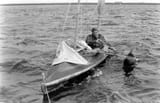Search Results
6/30/2025, 12:07:32 AM
>>2794434
Its possible to learn what you need to, but this will take some time. The more knowledge and experience you gather the better. This means you should be applying as crew, speaking to people that sail, and beginning to make your own opinions about what sailing is about. Then, you can
begin to determine what your ideal boat looks like.
Picking a boat specifically for its "ocean crossing capability" is a noob trap. Almost all boats that people buy are never sailed. They rot away in marinas, neglected, ignored. Project boat faggots buy a blistered shell and spend 2+ years trying to get it seaworthy, only to realise its a brick.
If you go in with no knowledge then the expenses required to refit and keep a boat seaworthy will shock you. Especially if you pick a bad one. (Warning: Most boats are bad.)
Once you own this boat, you will use your newly acquired skills and start sailing. You should be having fun. Day sails at first, and then some longer passages. Run into some rougher weather.
Know that full time, experienced sailors spend 99% of their time near coastlines, at anchor etc. A modest boat will surely cover you as you learn, and will also be cheaper in every single way, and much more convenient to own and store if needed.
Some of these smaller boats can achieve ocean crossings, despite what boomers say, if only the will is there. (Sail within your own abilities and knowledge though).
Of the handful of sailors that make a full crossing (<0.1% of sailors), most consider it to be an ordeal, even in their bluewater cruisers.
It probably seems cooler in your head than in reality. If you want to sail on both sides of the Atlantic, rather than taking your boat, it might be cheaper to just fly across and buy another boat when you get there.
You can see that even if you focus on using your boat for travel, there's gonna be a huge amount of sailing involved.
You need to love sailing more than you love travelling, because sometimes it will be hard.
Its possible to learn what you need to, but this will take some time. The more knowledge and experience you gather the better. This means you should be applying as crew, speaking to people that sail, and beginning to make your own opinions about what sailing is about. Then, you can
begin to determine what your ideal boat looks like.
Picking a boat specifically for its "ocean crossing capability" is a noob trap. Almost all boats that people buy are never sailed. They rot away in marinas, neglected, ignored. Project boat faggots buy a blistered shell and spend 2+ years trying to get it seaworthy, only to realise its a brick.
If you go in with no knowledge then the expenses required to refit and keep a boat seaworthy will shock you. Especially if you pick a bad one. (Warning: Most boats are bad.)
Once you own this boat, you will use your newly acquired skills and start sailing. You should be having fun. Day sails at first, and then some longer passages. Run into some rougher weather.
Know that full time, experienced sailors spend 99% of their time near coastlines, at anchor etc. A modest boat will surely cover you as you learn, and will also be cheaper in every single way, and much more convenient to own and store if needed.
Some of these smaller boats can achieve ocean crossings, despite what boomers say, if only the will is there. (Sail within your own abilities and knowledge though).
Of the handful of sailors that make a full crossing (<0.1% of sailors), most consider it to be an ordeal, even in their bluewater cruisers.
It probably seems cooler in your head than in reality. If you want to sail on both sides of the Atlantic, rather than taking your boat, it might be cheaper to just fly across and buy another boat when you get there.
You can see that even if you focus on using your boat for travel, there's gonna be a huge amount of sailing involved.
You need to love sailing more than you love travelling, because sometimes it will be hard.
Page 1
